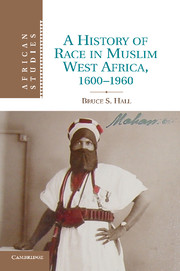Book contents
- Frontmatter
- Contents
- List of maps and figures
- Acknowledgments
- Note on orthography
- Abbreviations used in references
- Glossary
- Introduction
- PART ONE Race Along The Desert Edge, C. 1600–1900
- PART TWO Race And The Colonial Encounter, C. 1830–1936
- PART THREE The Morality of Descent, C. 1893–1940
- PART FOUR Race and Decolonization, C. 1940–1960
- Conclusion
- Index
- Misc-endmatter
- References
PART FOUR - Race and Decolonization, C. 1940–1960
Published online by Cambridge University Press: 05 August 2011
- Frontmatter
- Contents
- List of maps and figures
- Acknowledgments
- Note on orthography
- Abbreviations used in references
- Glossary
- Introduction
- PART ONE Race Along The Desert Edge, C. 1600–1900
- PART TWO Race And The Colonial Encounter, C. 1830–1936
- PART THREE The Morality of Descent, C. 1893–1940
- PART FOUR Race and Decolonization, C. 1940–1960
- Conclusion
- Index
- Misc-endmatter
- References
Summary
PRELUDE
In Part Four, I explore the racial rhetoric that animated local politics after the Second World War. There were two racial leitmotifs that emerged in the process of decolonization. One was embarrassment by French administrators, and outrage by black-African anticolonial leaders, at the fact that racialized slavery continued to exist among the pastoralist peoples of the Niger Bend, epitomized by the slavery of the Tamashek-speaking bellah-iklan. The other issue that drove local politics was the emergence of a racialized nationalism in certain elite Tuareg and Arab circles. As the eventuality of decolonization became clearer in the mid-1950s, the issue of racial separatism from blacks was raised as a rallying cry by several influential Arab and Tuareg political leaders. In the single chapter in Part Four, I trace the ways in which the politics of decolonization became a politics of race in the Niger Bend.
The process that would lead to decolonization began during the Second World War, when Charles de Gaulle convened a conference in Brazzaville in 1944 to prepare the ground for the postwar colonial reforms that France would need to make to ensure its ability to hold onto its territories in Africa. The Brazzaville reforms were designed to improve the economic and social welfare in the colonies, and to allow greater African political representation. Beginning with the founding of the French Union in 1946, there were a series of elections throughout Soudan that eventually culminated in the “yes” vote in the 1958 referendum to remain inside the reformed French Community.
- Type
- Chapter
- Information
- A History of Race in Muslim West Africa, 1600–1960 , pp. 273 - 275Publisher: Cambridge University PressPrint publication year: 2011

